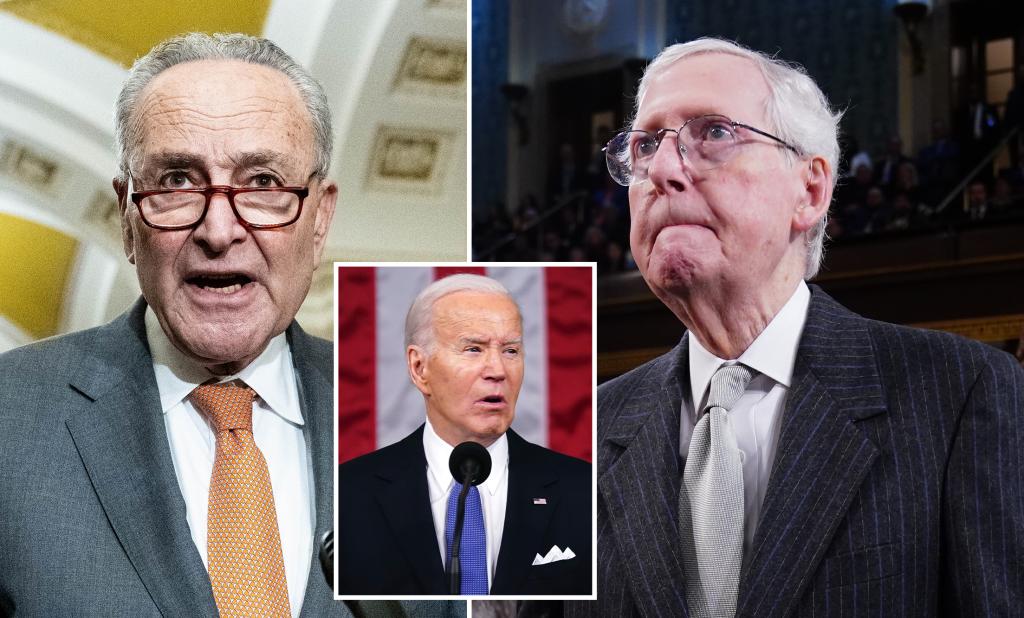politics
The Senate was on track Friday night to approve a $467.5 billion “minibus” spending bill aimed at averting a government shutdown, narrowly missing a midnight deadline.
The Senate voted early in the afternoon to limit debate on a package that would keep funding levels at roughly the same level for the Departments of Veterans Affairs, Agriculture, Transportation, Commerce, Justice and Housing and Urban Development until Sept. 30. It passed 63-35. The same goes for the Food and Drug Administration and military construction.
But it took several more hours for senators to agree on which amendments to consider instead of skipping the 30 hours of debate required before a final vote for passage.
In the end, Senate Minority Leader Chuck Schumer (D-N.Y.) announced that he would be able to support Sens. Mike Lee of Utah, Eric Schmidt of Missouri, Rick Scott of Florida, and Bill Hagerty of Tennessee. Four Republican senators agreed to consider the amendment. All four amendments failed.
“After months of hard work, we have some good news for this country,” Schumer said in announcing the vote. “We will continue to fund critical programs for mothers and children, veterans, the environment, housing and more.”
Senate President Pro Tempore Patty Murray (D-Wash.), the Senate's top spending official, praised the final document's provisions for “protecting critical funding” while avoiding a “pointless shutdown.”
Murray and other Democrats also celebrated a $1 billion increase in the Women, Infants, and Children (WIC) food program for low-income claimants, as well as Republican policy specials such as a ban on the abortion drug mifepristone. avoided.
Conservative Senate Republicans opposed the package, which included: 6,000 earmarksLee calls it “.”schumer minibus”—despite a procedural vote by Senate Minority Leader Mitch McConnell (R-Ky.) and 13 other Republicans.
“I would urge my colleagues to stop playing with fire here,” the top Republican, Appropriations Representative Susan Collins of Maine, said on the Senate floor. “The Republican-controlled House of Representatives passed these bills in six packages with very strong bipartisan votes, with a majority voting yes.
Collins added: “It would be irresponsible for us not to pass these bills and do the basic job of funding the government.”
As part of a side agreement struck during last May's fight to raise the debt ceiling, discretionary spending across the government would be reduced if the House and Senate pass a continuing resolution to fund the government at current levels through September. The 1% reduction will come into effect on April 30th.
Lee said this approach would reduce federal spending by $130 billion. Lee tried to block the spending bill on the Senate floor, but it failed 52-45.
The House approved the 1,050-page bill Wednesday by a vote of 339-85. It would require 60 votes to pass in the Senate.
Unless another spending package is passed, funding for the Departments of Defense, Homeland Security, Health and Human Services, and State will run out on March 22 at 11:59 p.m.
Schumer, Murray and McConnell vowed in a joint statement last month that the spending would pass on time.
House Speaker Mike Johnson (R-Louisiana) announced his 12 traditional spending bills to fund the government in two packages after expressing optimism about returning Congress to normal order. , a feat not accomplished since 1996.
“Despite a divided government and a historically small House majority, House Republicans have worked hard to successfully shift federal policy and spending priorities away from the previous Pelosi-Schumer FY23 appropriations. and American taxpayers will benefit from that,” Johnson said. he said in a statement after the first six bills were passed earlier this week.
In January, Mr. Johnson and Mr. Schumer negotiated a $1.66 trillion top line in federal spending for fiscal year 2024.
According to the Treasury Department, the U.S. national debt currently stands at $34.4 trillion, with deficit spending through fiscal year 2024 at $532 billion. Inflation has fallen to about 3%, but remains above pre-pandemic levels, according to data from the Bureau of Labor Statistics.
“Pork barrel spending conjures up images of large sums of money being handed out to politicians and special interests,” libertarian-leaning Sen. Rand Paul (R-Ky.) said in a floor speech before the vote. He said this in a floor speech. He frowned upon fiscal hawks.
“Pennsylvania senators took note of an organization that holds public sex parties in public, at any time, for anyone, any group, any number of people,” said Philadelphia-based William Way LGBT He said of the $1 million funding. Community center.
Democratic Sens. Bob Casey and John Fetterman had their slots cut from the bill Tuesday after the popular TikTok X account “Ribs” drew attention to the funding, but Fetterman He said he would. advocate it next year.
“This bill has 6,000 items and spends more than $12 billion,” Paul exclaimed in a floor speech. “But overall spending is in the hundreds of billions of dollars, and spending at this pace would result in $1.5 trillion in debt.”
Sen. Chris Murphy (D-Conn.) hit back at Republicans for “burying” their own controversial provision that would “roll back firearms background checks.”
This item prohibits U.S. veterans seeking federal benefits from being enrolled in the FBI's National Instant Criminal Background Check System unless they are determined by a judge to be dangerous.
“This cannot be brought to the fore. This provision could allow 20,000 severely mentally ill people to buy a new gun each year, but for many it would be a death sentence.” ” Murphy said. said in X.
“It is unacceptable that this provision was pushed by Republicans. Democrats should not have acquiesced.”
The increased spending undermines other conservative wins Johnson touted in his spending package, including a 10% cut to the Environmental Protection Agency, a 7% cut to the Bureau of Alcohol, Tobacco, Firearms and Explosives, and a 6% cut to the FBI. It was decided that
It also banned the sale of oil from the U.S. Strategic Petroleum Reserve to China and prohibited the Justice Department from investigating parents who exercise their free speech rights at school board meetings.


